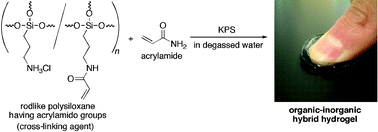Synthesis of organic–inorganic hybrid hydrogels using rodlike polysiloxane having acrylamido groups as a new cross-linking agent
Abstract
In this study, we synthesized organic–inorganic hybrid hydrogels using rodlike polysiloxane having acrylamido groups as a new cross-linking agent which had a regular higher-ordered structure. The cross-linking agents were prepared by reaction of


 Please wait while we load your content...
Please wait while we load your content...